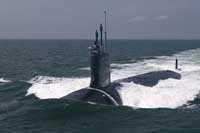US nuclear submarine collides with Japanese oil tanker
A U.S. nuclear-powered submarine collided with a Japanese crude oil tanker in the busy shipping lanes of the Straits of Hormuz, the U.S. Navy and Japanese government said Tuesday. No one was seriously injured.

Damage to the fast-attack USS Newport News submarine and the supertanker was light and there was no resulting spill of oil or leakage of nuclear fuel, officials from U.S. Navy, Japanese and Emirates government said.
Both ships remained able to navigate, Navy officials said.
The bow of the nuclear-powered Newport News was traveling submerged when it hit the stern of the supertanker Mogamigawa as the vessels were passing through the Straits Monday night, causing minor damage to the Japanese vessel, the U.S. Navy and Japan's Foreign Ministry said. The Japanese government said it was informed of the crash by the Navy and the U.S. Embassy in Tokyo, the AP said.
The tanker, operated by Japanese shipping company Kawasaki Kisen Kaisha Ltd., was able to continue to a nearby port in the United Arab Emirates, the statement said.
Commander Kevin Aandahl of the U.S. Navy's Fifth Fleet in Bahrain confirmed there had been a crash and that there were no injuries aboard either ship. Aandahl said the sub had surfaced and its crew was evaluating damage.
The Navy said the ship's nuclear propulsion plant was undamaged. The Newport News is based in Groton, Connecticut, and is part of a U.S.-led multinational task force patrolling the Persian Gulf and nearby seas. It has a crew of 127.
The Mogamigawa was traveling from the Gulf to Singapore and was carrying a crew of eight Japanese and 16 Filipinos, and is expected to arrive in the port of Khor Fakkan later Tuesday, company spokeswoman said on condition of anonymity, citing protocol.
She said crewmembers reported a sudden large bang and shaking just before the collision, but no other details were immediately available.
The Japanese government has asked the U.S. side to investigate. Aandahl said a Navy investigation would begin shortly.
In February 2001, a U.S. Navy submarine rammed into a Japanese fishing vessel in waters off Hawaii, killing nine people. The American captain's delay in apologizing for the crash triggered protests by the victims' families.
The 54-kilometer-wide (34-mile) Straits of Hormuz forms the entrance to the Gulf, through which about two-fifths of the world's oil supplies pass. Cargo vessels headed for Dubai, the world's largest manmade port, also pass through the straits, bordered by Iran and Oman.
U.S. naval vessels have been involved in previous collisions with commercial ships in the busy shipping lanes around the Persian Gulf. In September 2005, the U.S. nuclear submarine Philadelphia collided with a Turkish cargo ship in the Gulf, causing no injuries.
In July 2004, the aircraft carrier USS John F. Kennedy collided with a dhow in the Gulf, leaving no survivors on the traditional Arab sailing boat. The Navy relieved the Kennedy's commander, Capt. Stephen B. Squires, after the incident.
Fleets of U.S. and allied navy vessels conduct "maritime security operations" in the Persian Gulf, Arabian Sea and western Indian Ocean, attempting to block smuggling of weapons to Iraq and Somalia, nuclear components to Iran, as well as the movement of drug shipments and terrorists. U.S. and coalition ships started patrolling the coast of Somalia in recent weeks in a bid to capture any al-Qaida suspects fleeing Ethiopia's December invasion.
Subscribe to Pravda.Ru Telegram channel, Facebook, RSS!




